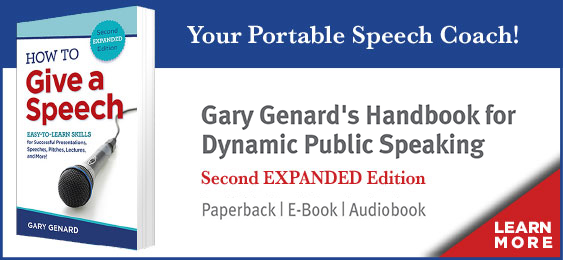Need a way to convey complex concepts to your audiences and be recognized as a powerful speaker? Want more charisma and memorability in your speeches and presentations? If so, why not borrow a page from the media side of public speaking?
Why not use a sound bite?
Sound bites aren't just for T.V and radio appearances. They can be used just as effectively in talks, lectures, meetings, and presentations of all kinds. These vivid comparisons work with in-person listeners exactly the same way they do with media audiences. (For maximum credibility and presence, download my free cheat sheet, "12 Easy Ways to Achieve Presence and Charisma.")
A sound bite's effectiveness depends upon four characteristics:
(1) Sound bites use metaphorical language.
(2) Sound bites make unexpected comparisons.
(3) Sound bites provoke emotional responses.
(4) Sound bites boil a complex concept down to a single vivid image.
That last point is the most important one for this discussion. Take this example:
Democratic strategist Joe Trippi once said that when a politician picks up a phone with a reporter on the other end, he or she is putting a .357 magnum to their head.
Now that’s an effective sound bite.
The analogy is crystal clear; and the comparison is an unexpected and therefore an interesting one. It certainly produces an emotional reaction in the listener (in this case, fear). Most vitally, “putting a .357 magnum to your head” is a single, vivid image.
All four characteristics named above are present and are used well. Equally important, the comparison has simplified and sold a complex concept. And don't wait. Audiences need to be engaged immediately. Here are 12 foolproof ways to grab your audience's attention, where a sound bite can work particularly well.
Republicans know how to use sound bites too. Here’s Sen. Everett Dirksen (1896-1969), on Democratic President Lyndon Johnson’s military policy in Vietnam:
All the piety of the administration will not put life into the bodies of the young men coming home in wooden boxes.
Here, the unexpected image of piety somehow re-vivifying dead young men is language that packs a donkey’s kick of emotional power.
Nibbles vs. Real Sound Bites
There’s one more quality a sound bite must have, however. It must achieve some form of elegance. In other words, it’s possible to include all four of the above components and still come up with a strained image that falls flat because it’s just plain clumsy.
Current Senator Dick Durbin’s (D-IL) response to the Medicare bill passed just before Thanksgiving in 2003 is an example of a sound bite with rubbery gums and no teeth. The senator said this:
The Republicans will give thanks for this bill, while the American people get stuffed.
Get it . . . Thanksgiving? Here, the comparison is strained, and the language clunky. This sound bite wouldn’t raise a nibble of anyone’s attention. Being short of time is no excuse, either. If you find yourself in the speech pressure cooker, download my cheat sheet, "How to Prepare a Speech in 15 Minutes."
As a general rule to convey a complex idea in a limited amount of time, then, remember this Sound Bite Rule: Use a comparison that makes your idea come vividly alive, in terms your listeners can understand and relate to. Something, perhaps, like this:
Arresting low-level drug users is like bailing out the Atlantic Ocean one teaspoonful at a time.
That fits the bill, doesn’t it?
You may not achieve sound bite stardom. But you can come up with something that helps your audience understand a complex issue a little more easily.
And don't forget: your closing is one of the most important parts of your speech! Conclude strongly so your message resonates in your audience's mind long after you've finished. Here are a dozen ways to end your speech vividly and memorably.
Key takeaways from this blog:
- Sound bites aren't just for television. They also work for presentations.
- To use sound bites, start thinking in terms of comparisons and metaphors.
- Consider the emotional responses listeners will have—that's important.
- Find a single vivid image to bring your message home.
- A sound bite can help you convey a complex concept simply and elegantly.



